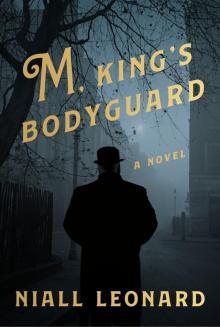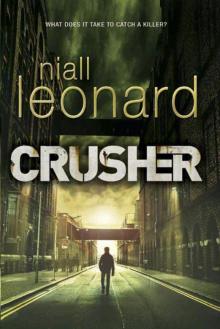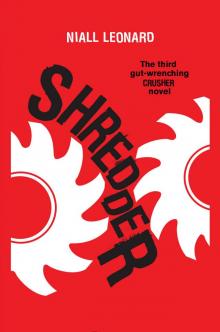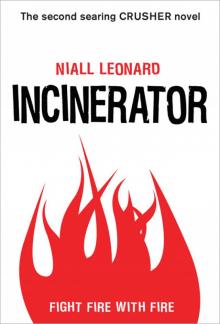- Home
- Niall Leonard
Crusher
Crusher Read online
The lines from “Pegasus” by Patrick Kavanagh are reprinted from Collected Poems, edited by Antoinette Quinn (Allen Lane, 2004), by kind permission of the Trustees of the Estate of the late Katherine B. Kavanagh, through the Jonathan Williams Literary Agency.
The lines from “Sweet Thames Flow Softly” by Ewan MacColl are reprinted by kind permission of The Bicycle Music Company.
This is a work of fiction. Names, characters, places, and incidents either are the product of the author’s imagination or are used fictitiously. Any resemblance to actual persons, living or dead, events, or locales is entirely coincidental.
Text copyright © 2012 by Niall Leonard
Jacket art copyright © 2012 by Stephen Mulcahey
Title lettering copyright © 2012 by Blacksheep
All rights reserved. Published in the United States by Delacorte Press, an imprint of Random House Children’s Books,
a division of Random House, Inc., New York.
Published simultaneously in hardcover by Doubleday, an imprint of
Random House Children’s Publishers UK,
a Random House Group Company, London, in 2012.
Permissions are pending for “Pegasus” by Patrick Kavanagh
and “Sweet Thames Flows Softly” by Ewan MacColl.
Delacorte Press is a registered trademark and the
colophon is a trademark of Random House, Inc.
Visit us on the Web! randomhouse.com/teens
Educators and librarians, for a variety of teaching tools, visit us at
RHTeachersLibrarians.com
Library of Congress Cataloging-in-Publication Data is available upon request.
eISBN: 978-0-449-81789-6
Random House Children’s Books supports the First Amendment and celebrates the right to read.
v3.1
For Erika
I have spread my dreams under your feet
Contents
Cover
Title Page
Copyright
Dedication
Chapter One
Chapter Two
Chapter Three
Chapter Four
Chapter Five
Chapter Six
Chapter Seven
Chapter Eight
Chapter Nine
Chapter Ten
Chapter Eleven
Chapter Twelve
Chapter Thirteen
Chapter Fourteen
Chapter Fifteen
Chapter Sixteen
Chapter Seventeen
Chapter Eighteen
Acknowledgements
one
It was a bit early for someone to be banging on the front door. I hurried down the stairs, hair still dripping from the shower, and turned the latch.
“Sorry, son, locked myself out,” said Dad, shivering as he stepped in. He’d been out in his slippers, I noticed. I wondered why, until I saw the TV trade mag folded in his hand, and my heart sank.
Dad looked pretty rough. His pale blue eyes were red-rimmed and his fair hair was standing up in spikes that weren’t dishevelled or trendy, but made him look like he’d slept in a doorway. I’d heard him come home late last night and stumble around trying not to make a noise, crashing into the furniture and cursing under his breath. But he’d got up the same time he always did, while I was out running, and the breakfast he’d made was still warm on the table: old eggs, thin salty bacon and instant coffee, white. I’d nab a glass of orange juice when I got to work, though the most orange thing about the stuff we sold was its colour.
“Bollocks,” said my dad, squinting through his crooked glasses at the magazine’s first inside page. That hadn’t taken long.
“What’s up?”
“Bill Winchester’s got a second series of that time-travelling cop show. Jammy sod.”
“Future Perfect?”
My dad gave a look as if I was being disloyal.
“Never seen it.” I shrugged. “I’ve heard of it, that’s all.”
“Me and Bill worked together years ago, on Henby General.”
“Yeah, you said.” But he didn’t say it very often.
Dad had been big in the early nineties. For a while he was everyone’s favourite twinkly-eyed Irish actor—he’d even won an award for Best Newcomer. The bronze statuette still stood on the mantelpiece, gathering ironic dust. From then on it had all been downhill. He didn’t keep the statuette on display out of nostalgia or vanity—it was there to fuel his envy. Envy keeps you hungry, Dad would say, which I’d never understood, because I was hungry all the time and I’d never got to like it. But all Dad’s old acting mates were doing better than him. If it had been true that every time a friend succeeds a little part of you dies, by now my dad would have been a really ripe zombie.
He saw himself as a passionate, committed and challenging performer. Directors soon got to see him as temperamental, pig-headed and impossible to work with. The jobs had already started to dry up when he met my mother, and his last role had been years ago, eating imaginary pizza on a desert island in a commercial, for insurance, I think … it might have been for pizzas, or desert islands. He never officially retired, but he grew a beard and stopped going to auditions and quit pestering his agent for work.
He wasn’t going to wait for the phone to ring, he said. He was going to make his own luck. He was going to write a TV epic so gripping and authentic that producers would be ripping each other’s throats out to make it, and he’d write a really good part for himself, so they’d have to cast him. Not the lead, of course—he had to be realistic, he said. The lead could go to one of his more famous old mates, to help get the show commissioned. He had it all worked out. He’d had it all worked out for years now, and it never seemed to happen.
“Don’t sweat it, Dad. You always say success is the best revenge.”
“Yeah, but I might be wrong,” said Dad. “Maybe the best revenge is cutting someone’s head off with a rusty saw. Maybe I should try that instead.”
I carried our empty plates out to the kitchen to wash up.
“So what are you doing today?” I said, more out of politeness than interest.
“Working,” he said.
Dad used the term loosely. A lot of his work seemed to consist of staring out the window. He had read every book on writing screenplays the local library could scrape together, and he was always quoting aphorisms and mottos about inspiration and perspiration and pants being applied to the seat of a chair, and he always wrote ten pages a day. The only problem was, next day he’d tear up nine of them. Some days he’d go traipsing round London doing “research,” and the notes and jottings and cuttings would pile up on the dining table beside his laptop, and over dinner he’d try to tell me about his latest story idea, but I’d stopped listening long ago.
“You wouldn’t believe the stuff I heard last night,” said Dad. “London gangland is like the court of Caligula—they’re all stabbing each other in the back. That’s the real drama, and it’s right under our noses, and nobody ever wants to hear about it.” Then why the hell are you writing about it? I thought. But I didn’t say it. The best thing about Dad was his eternal optimism. Someday, with a lot of effort and a little luck, he’d be rich and famous, and we wouldn’t have to scrape by on his shrinking royalty payments and my minimum wage from Max Snax.
“You want me to bring something back for dinner?” I said.
“Nah,” said Dad. “I’ll probably go down the shops later.” He wouldn’t go into the shops, I knew, until he’d checked the skips outside for ready meals chucked out after their sell-by date. He’d serve them up with a sermon about the evils of the consumer society and the wastage it produced. I used to think, if wastage keeps us in dinners, I’m all for it.
“You know where the spar
e keys are?” asked Dad as I laced up my trainers.
“Hanging up,” I said. “Rough night?”
“Never mind,” said Dad. “Mine will turn up.”
“I’ll see you later, yeah?” I rose to go, expecting his routine grunted goodbye, but he put the magazine down and looked at me.
“Finn?” he said. “We’re all right, aren’t we? You and me?”
All right? How were we all right? I was an illiterate dropout with no GCSEs stuck in a dead-end job, and he was an ex-nobody who spent his days writing a script that would never be finished and that no one would ever want to read anyway.
“Yeah, Dad, sure. I have to go.”
“See ya,” said Dad.
I pulled the door shut behind me, jogged a short distance to warm up, then started to run.
“Yeah, I want the Texas Chicken Special, no salad, no sauce, none of that.”
“What, just chicken and bread?”
“Yeah.”
He was about five foot tall and five foot round the middle, and I could see why. I always used to wonder how guys like Mr. Spherical kept their trousers up—were their belts stapled to their stomachs? Anyway, without the sauce it wasn’t a Texas Chicken Special, it was just fried chicken in pappy white bread, but I wasn’t there to quibble with the customers about what the stuff was called, I was there to sell it to them. And smile. And say thank you. “Smiles and thanks—money in the bank!” Andy used to recite that at our weekly pep talks. He was fond of morale-boosting slogans, and thought he had a knack for coining them, but his own were even crappier than the ones on the Max Snax staff training videos.
I punched the order into the programmed till and handed Mr. Spherical his change. Jerry in the kitchen slid the foil-wrapped package into the chute while I filled a litre beaker with half a litre of ice followed by half a litre of fizzy aerated syrup, wondering for the thousandth time how anyone could consider this chemically reconstituted muck to be food, and how I’d ended up selling it. I pushed the thoughts aside for the thousandth time, but they kept flopping back into my mind, like an annoying greasy fringe you can’t cut off getting into your eyes. And it was only bloody Monday.
Hands on automatic, mind anywhere else but here, bish, bosh, sandwich, regulation single paper napkin, drink, tray, deep breath, stab at a smile, recite the fast-food blessing: “Thank you, sir, and enjoy—have a great day.” The tubby punter grunted, turned and waddled off to the door, turned round again and bumped out backwards, into the bright April morning that I was pissing away behind this overheated counter in this sweaty polyester shirt.
“Yo, Maguire!” hissed Jerry from the kitchen. “Thanking time is wanking time!” Not quite the approved formula, but he had the Max Snax high-pitched, hysterical delivery down pat. I didn’t mind Jerry. He was almost bearable, as long as you didn’t try having an actual conversation with him. You couldn’t look him in the eye, anyway—either he had curvature of the spine or he spent too much time bent over computer porn, jerking off. Andy wouldn’t let him serve the customers, insisting that I gave a better impression of Max Snax. If I did, it was because I ran ten kilometres a day and never ate anything we sold, but I didn’t say that to Andy. I flicked Jerry a cheery middle finger. He sniggered and ducked back towards the fryers, while I cursed myself.
How could I have forgotten about the CCTV? Andy had cameras all over the joint, concealed under little black plastic domes, most of them pointed at the staff rather than the punters. I used to wonder why Andy had gone into catering, when he didn’t like people. He disliked the punters on a casual basis, but he made a full-time job of despising the staff. That was why he stayed in his office all day, watching us all through CCTV monitors. He wanted to check we weren’t stealing the fries or sneaking off to the bogs to smoke a spliff, but he wouldn’t join us on the floor to do that. Instead, he would sit poised in front of his six fuzzy monitors, waiting until he spotted an infraction of one of the hundreds of “suggestions” that made up the Max Snax Code of Conduct. Then his office door would silently open, and Andy would emerge like a nervous hermit crab scavenging the ocean floor for whatever it is hermit crabs eat. And now, as I had dreaded, his door was opening. I was about to get a three-minute lecture on proper behaviour for customer-facing operatives, which did not include obscene hand gestures to the kitchen staff.
Andy extruded himself from his office. He was in his mid-thirties, I guessed, and always wore the shirt and tie he considered appropriate to a management position. I was always morbidly fascinated by Andy’s hairstyle—he had a decent head of hair, but by carefully calculated use of a comb-over, he managed to make himself look like a balding fifty-year-old. His complexion was blotchy and pale, and he compensated for this with a fake tan—not from an expensive sun bed, but from a bottle. Closer inspection, which I usually tended to avoid, confirmed it. Sun beds generally don’t leave pale streaks on your orange forehead or a faint tangerine tinge on the collar of your shirt.
“Finn …” Andy bobbed and weaved and avoided my eye. He’d missed my finger to Jerry, I thought. This is something else. Probably a shit job he doesn’t have the inclination to do himself—that’s what he was paying us the statutory minimum wage for. “We have a clientele turnover issue.” I stared at him, doing my best to look mystified. I knew what he was saying, but I wanted to see if he could express it in English. “Over there.” He nodded as discreetly as he could towards the table in the corner of the restaurant furthest from the counter.
She’d arrived mid-morning, ordered hot chocolate, and sat there sipping it for the next forty-five minutes. She was about my age, in the brown uniform of Kew School for Girls, although I doubted the stud in her nose was an approved part of the outfit. Her tangled black hair fell across her face and she was wearing too much eyeliner, but it failed to hide the fact that she had clear, pale skin, fine bone structure, and curves even the frumpy uniform couldn’t straighten out. Not as curvy as she could have been, for all that: at a guess she was about five kilos under her healthy weight. That was one reason she stood out in here. The other was that she was the only customer. It was too late in the morning even for the student crowd, and too early for the weekday lunch crowd.
“What’s the problem?”
“She’s blocking our prime seating.”
I glanced over. I wasn’t aware we had any prime seating. All of them were bright green plastic around bright yellow tables, and all of them had the same thrilling view of our car park, if you didn’t allow for the vast window stickers that advertised Max Snax’s latest blend of herbs, spices, salt, more salt and chemical gloop that coated our pinky-grey mechanically-recovered-chicken-product.
“But there’s no one else here,” I pointed out.
“Because she’s blocking our prime seating!” hissed Andy. “And her attitude … it doesn’t fit with our corporate image.”
The first few weeks after I started work here I had found Andy’s bullshit funny. I used to relay his latest examples of ridiculous corporate gobbledegook to my dad, and we’d both have a go at talking like that—“Could you transfer the sodium condiment across the consumption platform?” Then, after three or four months of it, I’d realized I might be working in Max Snax for years, soaking up the smell of stale fat, rolling myself in Max’s special chemical mix until I was permanently coated in it, and the joke was on me, and it wasn’t funny any more.
“Tell her she has to order something or re-allocate her custom.”
“Re-allocate her …?”
“Now, please, Finn.”
He darted back towards his office. For a moment his little crab antennae waved, sniffing the greasy air, then he slipped inside and the door clicked shut. I could visualize him settling back into his vinyl leather-look executive armchair, watching the monitor, waiting for me to redeploy unwelcome clientele. Timing me, probably. I sighed and made my way over.
“Hi there.”
She had been staring at the traffic turning the corner at the junction outside, as
if waiting for a car crash to break up the empty monotony of her morning. She turned to me. Her eyes were bright green, almost too large for her heart-shaped face. I found myself wondering what colour her hair really was under the jet-black dye.
“Can I get you anything?”
“Didn’t know they had waiter service here.” Her tone was off-hand, a little amused, as if she was flirting, but not really. Her heart wasn’t in it.
“We don’t.”
“Then why are you asking?”
“The manager wants you to buy something.”
“I did buy something.”
The amusement had evaporated. She knew what I had come over to say, and was going to argue about it. It was pointless, and her morning was spoiled before we’d even started, but a row would do as well as a car crash. I hadn’t felt sorry for her till then.
“Let me get you another not-chocolate,” I offered. She missed the pun, and I was glad. It sounded ingratiating and pathetic.
“Forget it. It tastes like piss mixed with soap.”
“Really? I wouldn’t know.”
Her nostrils flared angrily. I was angry too, wondering why I’d got myself into a playground spat on Andy’s orders. And wondering whether she’d put stuff on her lips to make them that shape and colour.
“So I have to order something, or you’ll throw me out?”
“No, you don’t. I’ll buy it, and you won’t even have to drink it. But that way you can sit here as long as you like.”
She sighed, glanced out across the car park again, then flashed me a huge smile. “Actually, Finn, could you do me a Max Snack? One of those big triple-deckers?”
Of course she knew my name. It was printed in big happy Max Snax font on the little badge pinned just over my left tit. Punters always ignored it until they wanted to complain.
“With everything?”
“Yeah, extra barbecue sauce, pickles, the works.”
“Sure.” I didn’t move.
“And a giant cola.”

 M, King's Bodyguard
M, King's Bodyguard Crusher
Crusher Shredder
Shredder Incinerator
Incinerator